Parts shopping in Asia
Updated 7/13/13 - Hino Audio is gone!
My "day job" takes me to Asia fairly frequently. When I have spare time, I've tried to seek out decent shops that have tube audio-related parts.
Japan:
If you should ever find yourself in Japan, or would like an excellent tube audio adventure trip, you need to go to Akihabara. Akihabara - "electric town" - is Tokyo's electronic shopping district. Mostly what you'd expect - consumer electronics stuff - but has a good amount of little places that sell DIY parts. Especially in the area right around the JR Akihabara train station, there are some little stall shops that have some really nice stuff.
Here's an English-language page with some good introductory info on Akihabara.
Some photos of Akihabara:
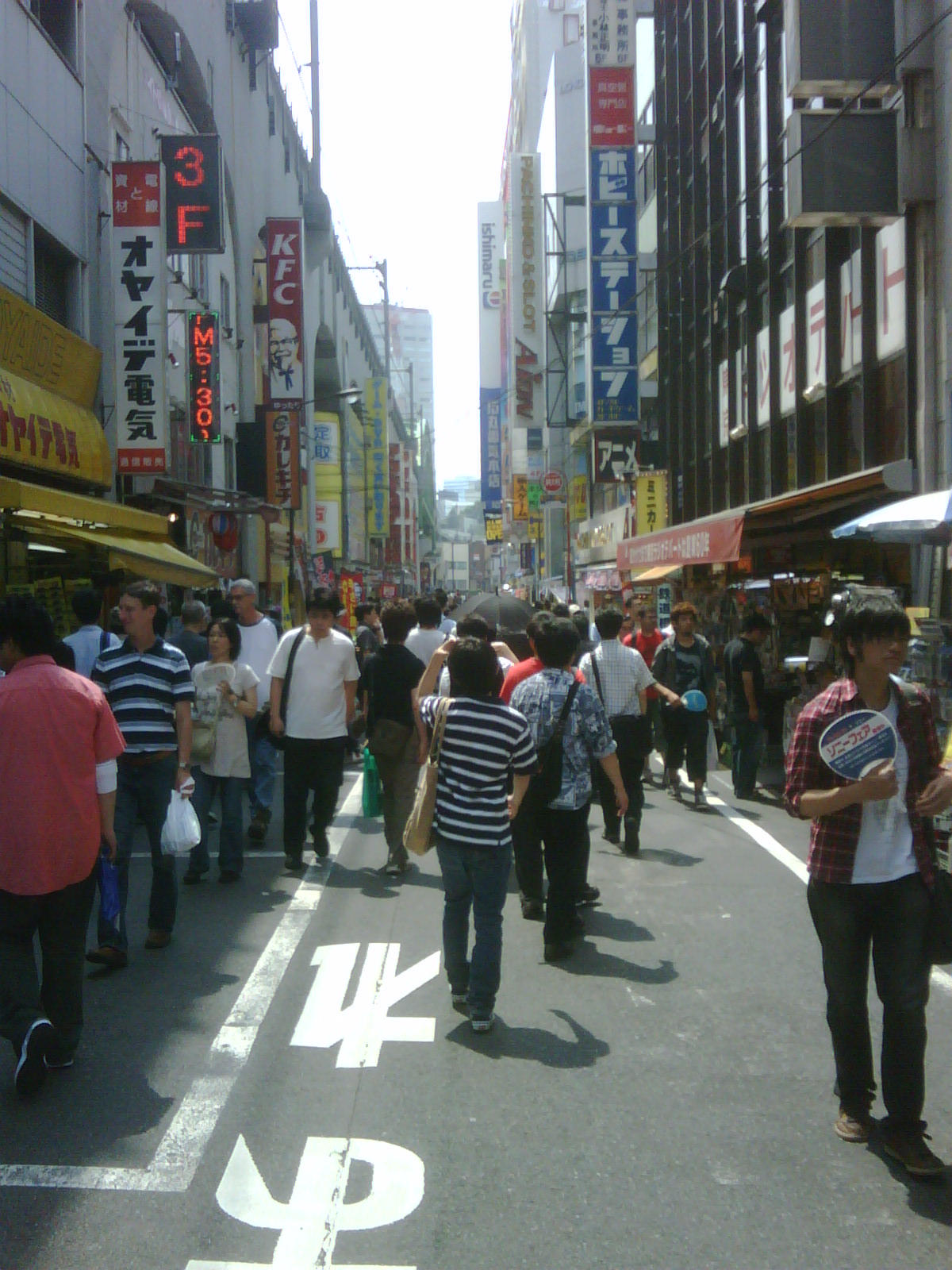
Standing in front of the Tokyo Radio Department building (to the right) looking North
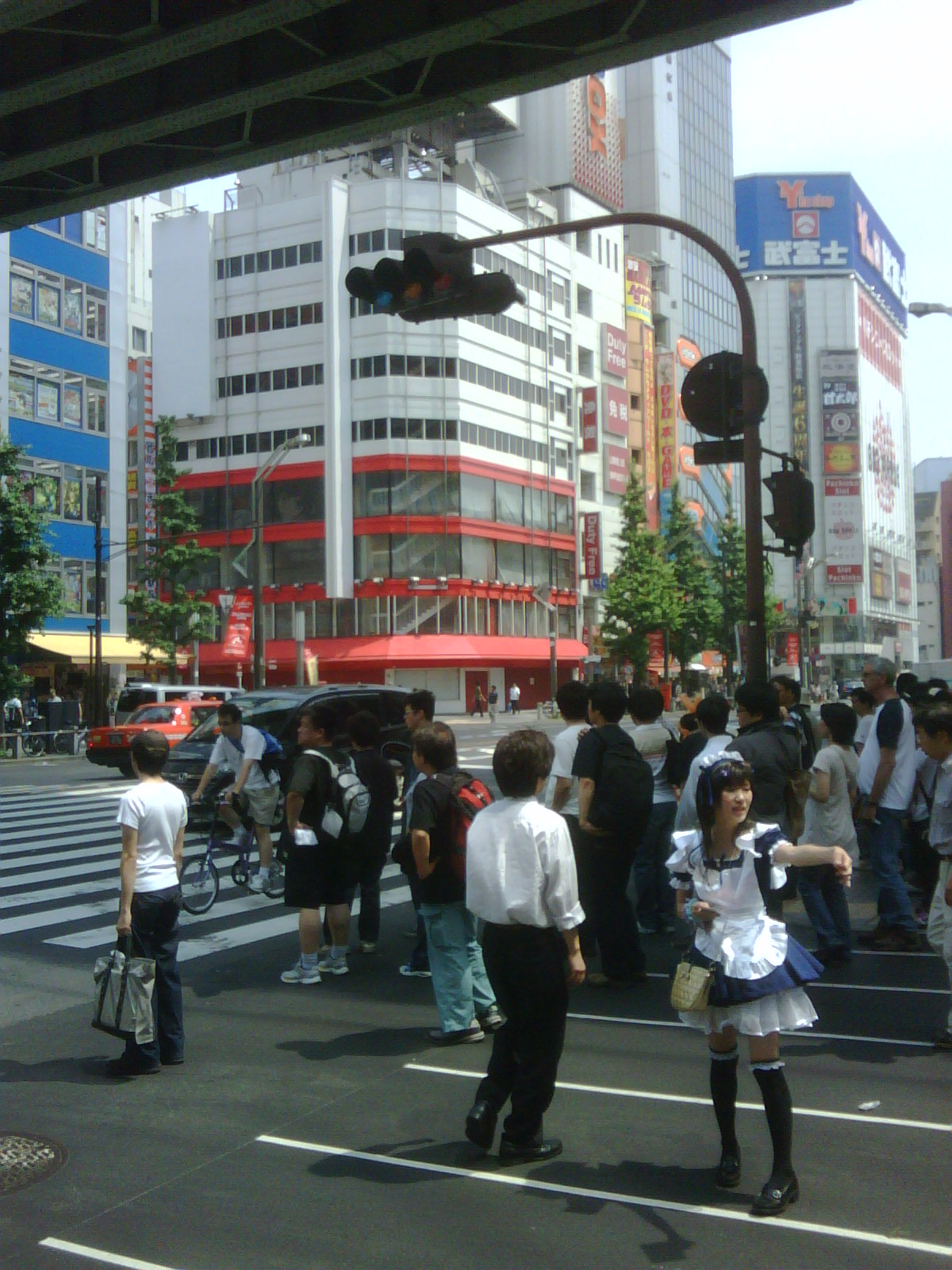
In front of JR Akihabara station, looking Northeast across Chuo-dori. The station is just out of sight to the left.
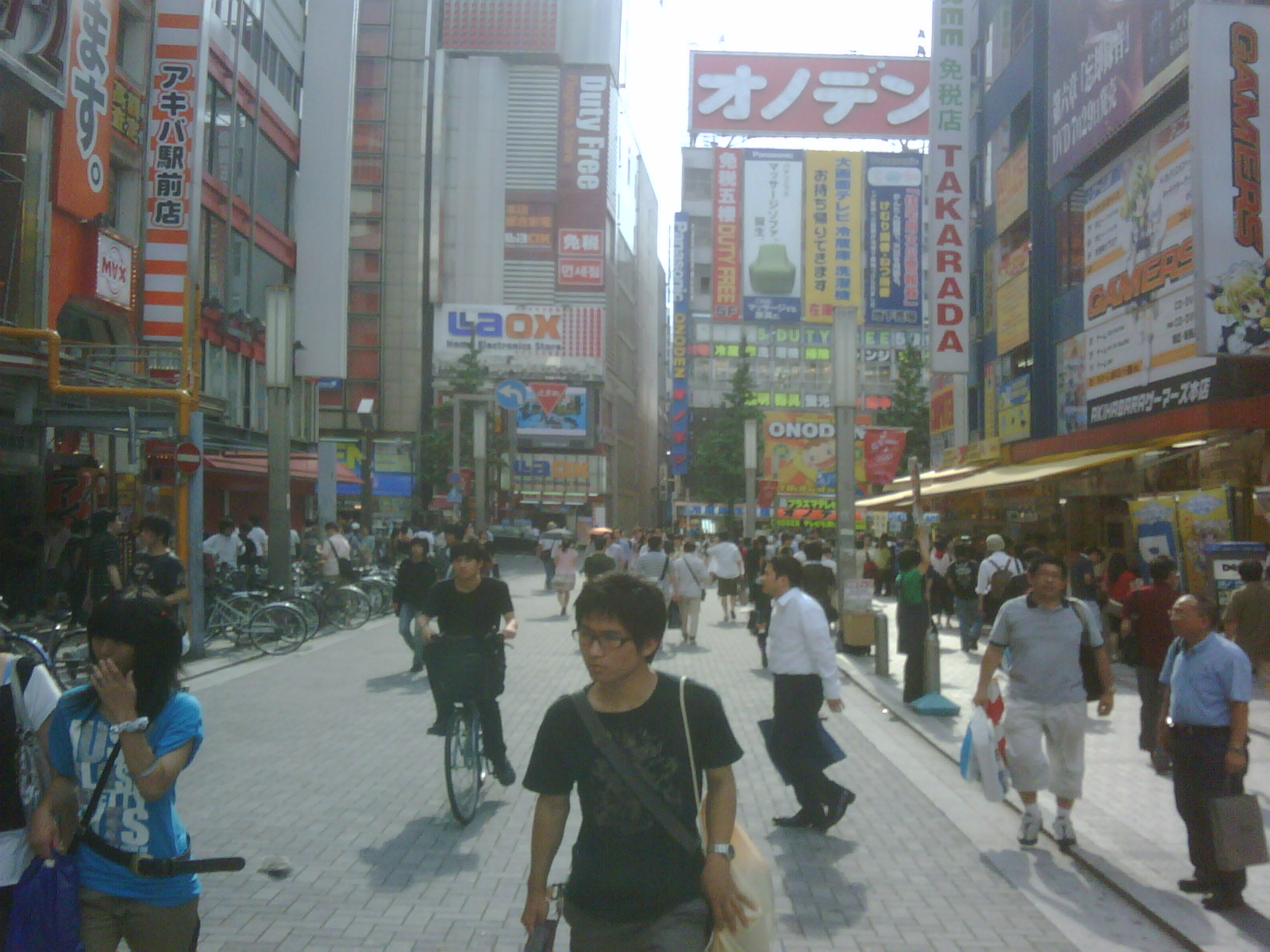
On the Southwest side of the station, looking North towards Chuo-dori.
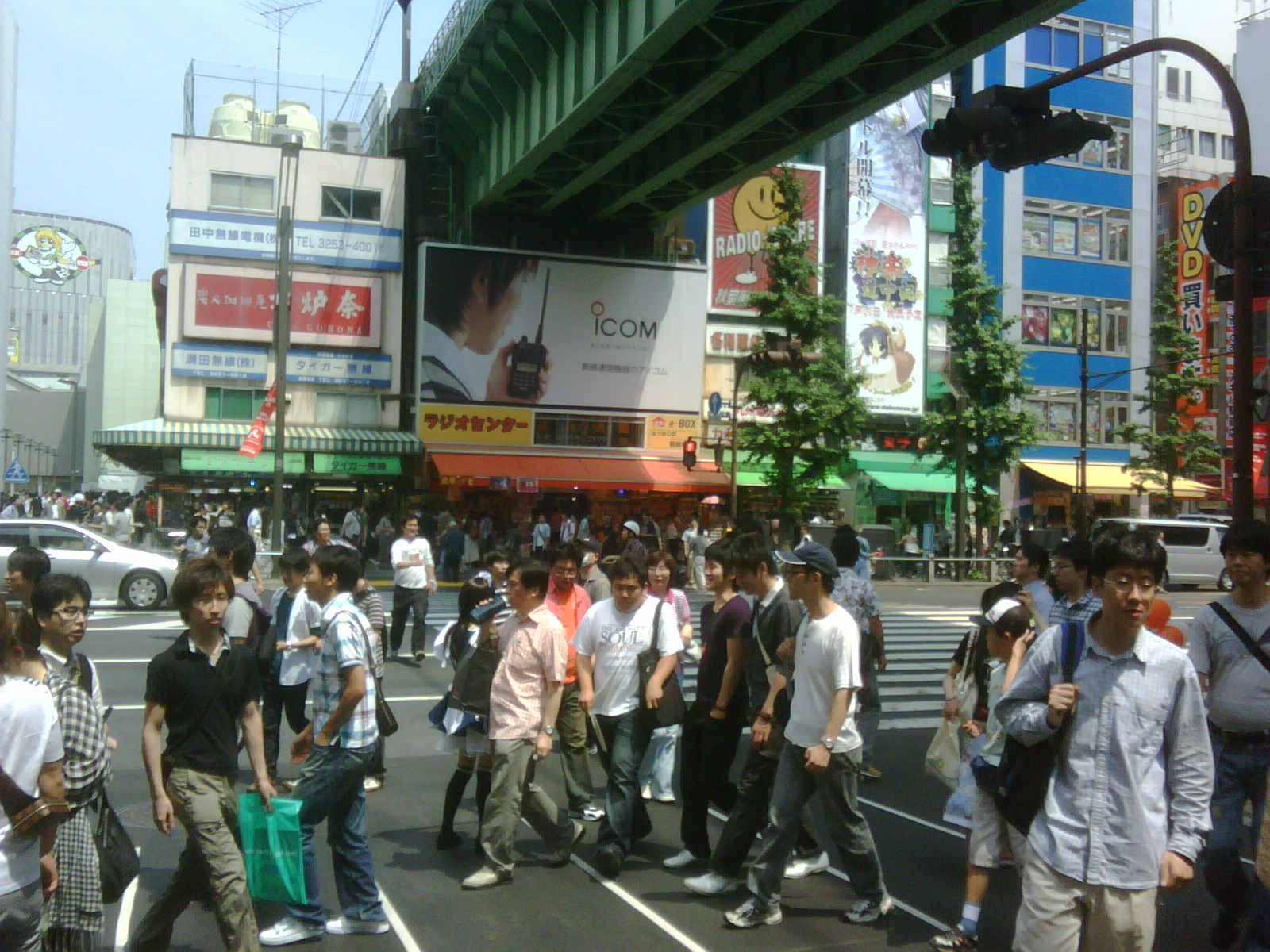
Across Chuo-dori from the station, looking South back towards the station. The "Radio Center" (small stalls selling parts) is under the tracks across the street, under the Icom sign. You can see Yodobashi Camera on the far side of the station to the left.
I found that buying two pairs of Tango OPT's in person in Japan actually paid for my airfare from Denver (USA) to Tokyo... granted, I got a great ticket price ($450 round trip!), but still, some things are much cheaper there!
The easiest way to get to Akihabara is to take a JR train to Akihabara station. You can also get there by other train lines or subway, but I've always found JR is easiest for the non-Japanese visitor. Most JR trains in the Tokyo metro area have signs and announcements in English.
Akihabara station is North of Tokyo station, and East of Shinjuku, at the intersection of the Sobu and Yamanote lines. JR has a good English-language map of the Tokyo rail system, and also English maps of major stations that will help you find your way around Tokyo. Coming from Shinjuku, either take the Chuo/Sobu local train (yellow) towards Yoyogi and Chiba (a local train that makes lots of stop), or take the Chuo line rapid train (orange) towards Tokyo station, then change to the Chuo local train at Ochanomizu (just get off and walk across the platform to the yellow train). One stop and you're at Akihabara. From Tokyo station, take the Yamanote line (green) towards Kanda and Ueno - I think it's two stops to Akihabara.
Once you're at the station, it can be hard to orient yourself. The JR English map of Akihabara station which will help. This map is oriented correctly (with North up). Note that the Electric Town exit is under the tracks to he West of the station, and you will exit either to the North or the South of the tracks. The Central gate and the Show-Dori exit are on the same side of the station (East), but the Showa-Dori exit is across the street (basically into the Yodobashi Camera building).
A note on finding your way around Akihabara: when you're trying to find a place, and are looking at one of the maps provided by a web site... there is no standard as to which way is North! You have to try and orient the map relative to a known landmark. Akihabara maps almost always show the JR Akihabara station, but North may be up, down, left or right.
Another note is that things are usually a lot closer than you think by looking at the map. I've walked a few blocks only to realize that I passed the place I was looking for. Many of the maps are very small scale - what may look like a normal US city block on the map might only be 10 yards or so, so be careful and pay attention.
Also, remember to look up. Many shops are in upper floors of buildings, and are not obvious from the street. Usually they have signs up on the building. Don't be afraid to walk up the stairs - you never know what you'll stumble into!
Note that almost all the web site links below are to Japanese-language pages. You may have to set the encoding to Japanese to view them correctly. Even if you don't read Japanese you can gain useful info from these sites by poking around, or use Google translation.
I've been spending so much time in Japan lately that I decided to put together some of my own maps. These show the places that are important to a DIY audio guy. I don't show any of the dozens of computer shops, gaming shops, or Anime houses. Sorry they take some time to load, but I wanted to make these detailed enough that you can find the shops...
North is up (towards the top of the map) in all of these.
The first map shows JR Akihabara station and the immediate area:
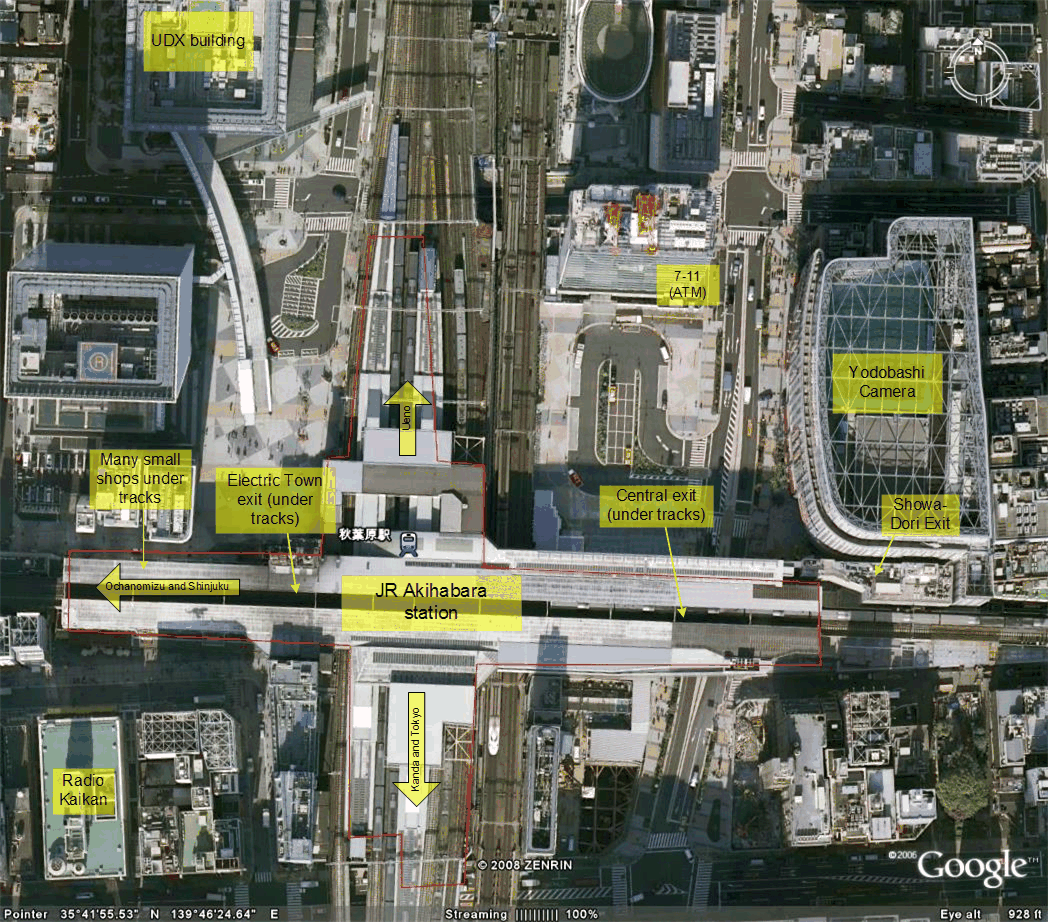
This shows the area immediately West and South of the station:
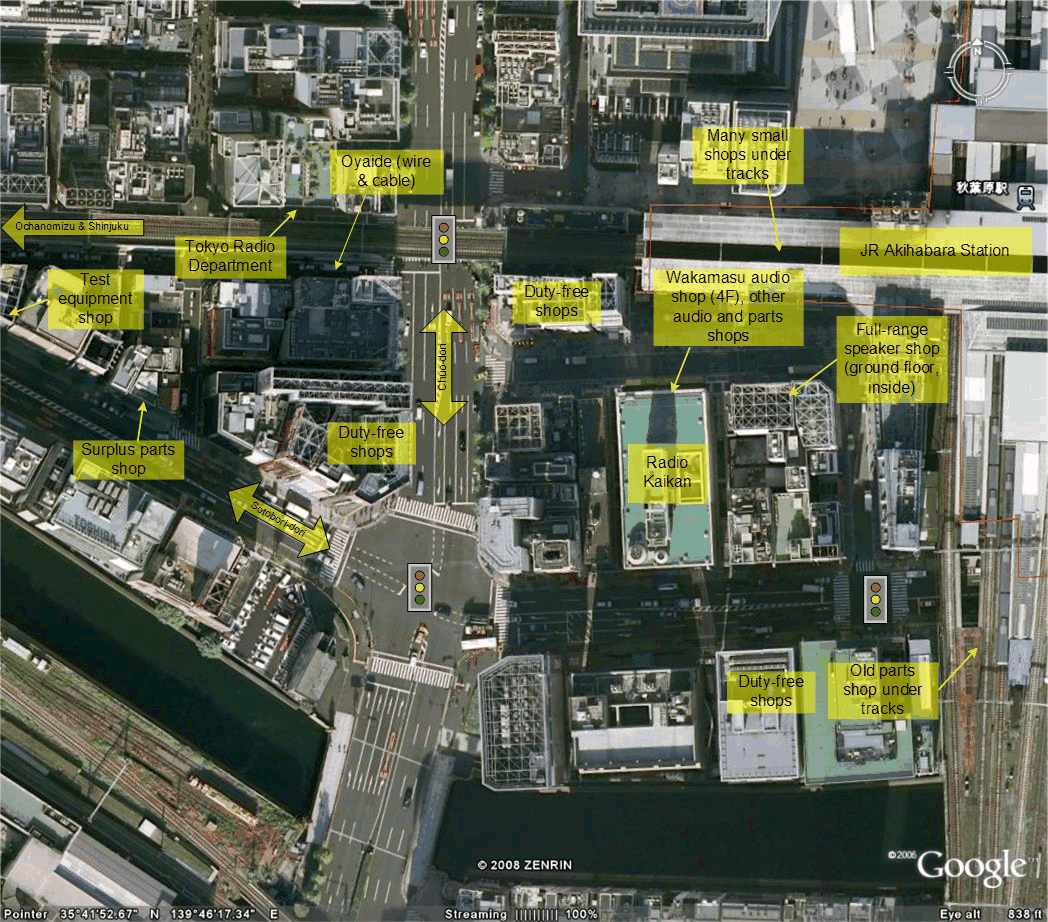
Next is the area to the immediate North and West of the station:
And then the area a bit further North:
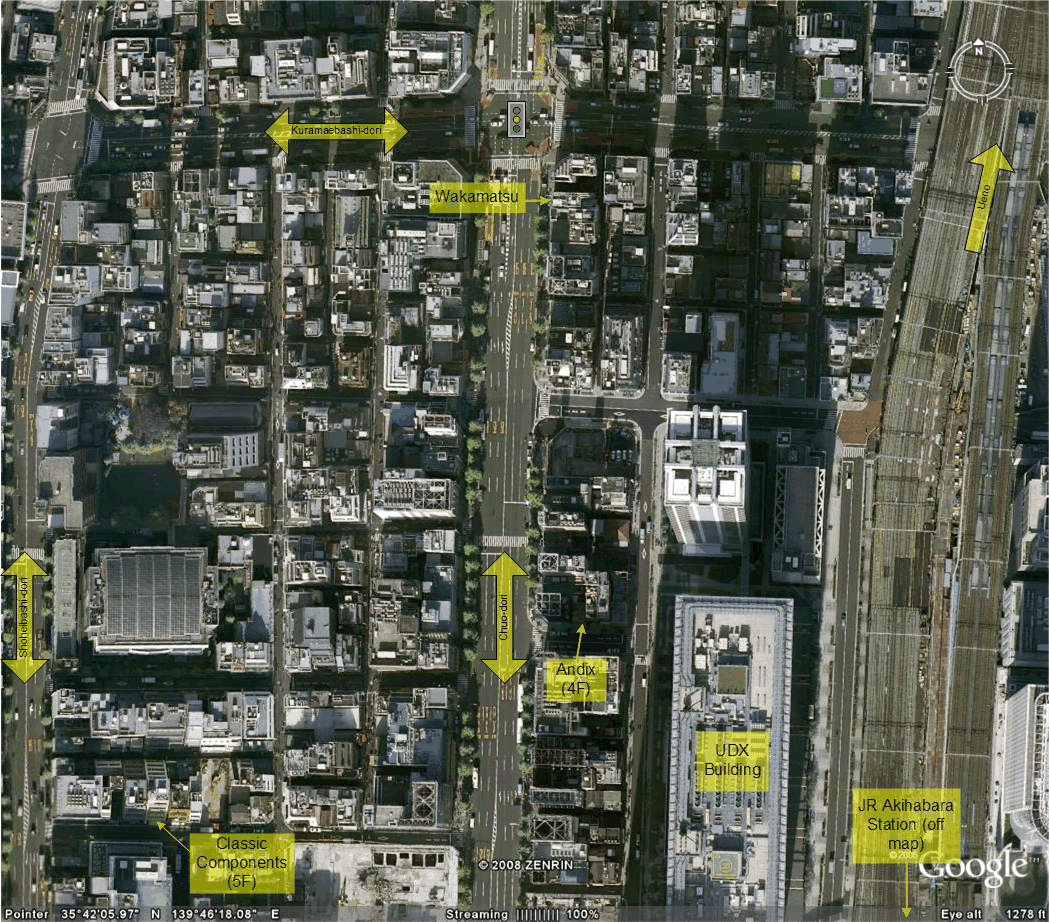
The first stop to make is right outside the JR station to the West, underneath the Sobu line tracks that lead back towards Ochanomizu (and Shinjuku). Called the "Radio center", there are two floors of mostly tiny stalls that sell all types of electronic stuff. Many have generic selections of LEDs, switches, and connectors, but there are shops that specialize in things like relays and transformers that are particularly nice. Amtrans has a stall here, which sells tubes (mostly expensive) and also has a good selection of sockets that are hard to find. There are also shops that specialize in CCTV, ham radio, and light bulbs, among other things.
For general electronic components, one of the best places is Tokyo Radio Department (TRD) building. The TRD building is just outside the station, just to the West across Chuo-dori (Chuo Avenue), the "main street" of Akihabara. Inside the TRD building you'll find four floors of parts sellers, specializing in everything from metal case parts to resistors and caps to vacuum tubes. This is one of the best places I know to buy things like tube sockets, passive components, and Alps pots. UPDATE 5/28/12 - There are now several new tube shops in TRD. Definitely worth a visit.
Definitely visit Noguchi Transformers, in the basement level of TRD. Don't count on anybody there being able to speak English, but if you come knowing what you want, you won't have any problems. Check out Noguchi's website, and you can at least figure out what they have, and get the prices (in JP Yen).
Outside TRD and across the alley is a shop that sells all types of wire and cable called Oyaide. They have materials to make some nice interconnect and speaker cables.
Hino Audio is no longer...
Another shop I really like is Classic Components. Classic Components is mostly a tube vendor, but also carries sockets, Tango and Hammond transformers, capacitors, and other tube-related parts. This is the best tube shop I've visited in Japan so far. Don't expect bargains on rare NOS tubes - they are as expensive here as anywhere - but I have occasionally found very good prices (like Amperex 8608's for $9.00 each), and also a surprising selection of unusual US tube types (like dual-cap VT-235 and 2C26A tubes).
Classic Components is hard to find, even if you read Japanese. Follow their map (on this map, North is actually up)... look for a small yellow brick building (near the end of the street). There's a small PC shop on the ground floor. Take the elevator (to the left of the PC shop) to the 5th floor. Very little English is spoken. They take credit cards... so you will be tempted to spend more than you planned :)
Andix is another tube shop. Smaller than Classic, it may be worth a visit. It's located a bit North of the Electric Town exit. Note their map has North to the left... the shop is on the 4th floor (I think), and there is a sign on the outside of the building.
Of course there are many electronics shops that cater to the general electronics DIY crowd (as opposed to tube audio geeks). Some carry a few tube-specific parts but focus on other items. A few of note:
Wakamatsu is one worth looking at. They have a small building with six floors, located a few blocks North of the station along Chuo-dori. Each floor has different stuff, ranging from PC parts to audio parts. They also have an audio specialty shop in a the Radio Kaikan building (above) just outside the South Electric Town exit.
Akizukidenshi has been recommended to me, but I have yet to visit them. Judging from their web site they have a good parts selection.
Sengoku is another large general electronics shop.
There's a small shop that sells surplus parts cheap on Sotobori-dori, a block West and a little South of the station... sorry, I don't know what it's called. Nearby, a little further along Sotobori-dori near where it crosses the tracks is a test equipment store that has an interesting assortment of old and new test equipment.
If you're interested in headphones, or just want to see the mother of all consumer electronics stores, you must visit Yodobashi Camera in Akihabara. The Yodobashi store is in the opposite direction from "Electric Town", to the Northeast of the JR station. If you go out the Showa-Dori exit you wind up right at Yodobashi. It is a big store, hard to miss.
Yodobashi also has other stores (in Shinjuku, for example), but the Akiba store is the best. Almost half a city block in size, with six floors of electronics, plus one floor each of food, books and music, and golf items. Their headphone / earbud / IEM selection is mind-boggling; I estimate several HUNDRED different models, from $1.00 to $1000 or more. And you can listen to any of them (OK, not the cheap blister-packed ones, but pretty much everything else). Don't expect to find US or European models any cheaper here than anywhere else, but if you want Japanese phones like Denon, Sony, or Audio-Technica you may find them cheaper here than elsewhere. I know for a fact that A-T phones are cheaper here than in the US, and you can be assured they are not cheap Chinese knock-offs. And there's a good 24-hour sushi place outside on the ground floor, and another one on the 8th floor in the food court (cheaper conveyor-belt sushi).
You can find some additional info on Akihabara by surfing and Googling, but there are not many pages in English. Here is one, an "official" Akihabra web site. Designed for tourists who want to buy products and duty-free sales, it still has some useful info.
A note on money: Most small parts shops accept only Japanese cash. Some high-end places, and those that cater to foreign tourists like duty-free places), and departments stores (like Yodobashi) will take cards. The best way to get Japanese cash is not at a foreign exchange booth - just take out cash from an ATM. Not all ATMs support foreign cards or speak English, but all of the ATMs at 7-11 stores seem to work and have an English option. They might change a small fee (~200 yen) just like in the US. You can also use cards at machines from American banks like Citibank, but they're harder to find.
Hong Kong:
You have to be a little careful in Hong Kong... there are plenty of fakes and frauds around. I generally don't buy "expensive" tubes anyway, but I definitely wouldn't go shopping for rare tubes in HK: you're as likely as not to get some cleverly relabeled Chinese tube.
But there are good places, and Hong Kong is a great place to wander around.
Brian Cherry's DIY Hi-Fi Supply is one of them. Worth a visit to have a look at his products, and he carries some parts he has custom-made that can't be found elsewhere. This is one shop in HK that you can trust. Not a bad walk from the subway station and English is not a problem.
A walk through the Apliu Street market is worthwhile. Most of the stuff in the street stalls are not very interesting, lots of cheap consumer stuff. I did find some worthwhile parts there, though, like OS-CON caps at one-tenth the price you have to pay a US distributor, and some connectors and cable There are also regular shops along the streets, several of which cater to tube audio DIY'ers. The Apliu street market is easy to get to - take the MTR (subway) to the Sham Shui Po station, and go out the Apliu street exit. You're there!
One Apliu shop I found particularly good is the Wing-Shing (Sham-Shui-Po) electronic company (174 Apliu Street). They had a good selection of parts, like Riken resistors for HK$10 (about US$1.25), black gates, Elna cerafines, ALPS pots, etc.
Taiwan:
I've been visiting Taiwan quite a bit lately, and though I still have a hard time finding my way around Taipei, I have found a few good places to shop for parts. Especially if you're looking for decent (not "designer") parts on a budget, Taiwan is a good place to buy parts. I'm convinced many of the no-brand parts like audio connectors that you can buy for a buck or two in Taiwan come from the same Chinese factories that produce the big-name (and big-$$$) parts.
One good spot is a nondescript building, called "Hsi Ning Public Housing" located near the Chungsiao bridge, at the corner of Chungsiao W. Road and Hsining S. Road. This is about 5 block from the Taipei main railway station, towards the Tanshui river. There are no signs to speak of outside, and the first floor outside is mostly little food stands - but inside is an electronics market (the Hsi Ning market), with dozens of individual shops on two or three floors. The shops specialize in all kinds of electronic things, including used test equipment, wire, power supplies, tubes, used audio components, speakers - you name it.
I think the easiest way for a westerner to get around Taipei is by taxi. It's inexpensive - a typical ride across town might set you back US$5.00 or so, though traffic can be slow. Only some taxi drivers speak English, so you're best off getting directions in Chinese from your hotel, or bring a map. I found a map online that might help.
If you walk around the streets and alleys nearby you will find other audio and electronics ships (as well as places selling things like fresh pig intestine). There are a couple of shops who will wind you custom power transformers very inexpensively. Best bring somebody who can speak Mandarin, or be prepared for lots of drawing and hand waving.
Also worth a visit is THL Audio. They don't seem to carry a lot of inventory, but speak English and are helpful. THL carries James transformers, among other things.